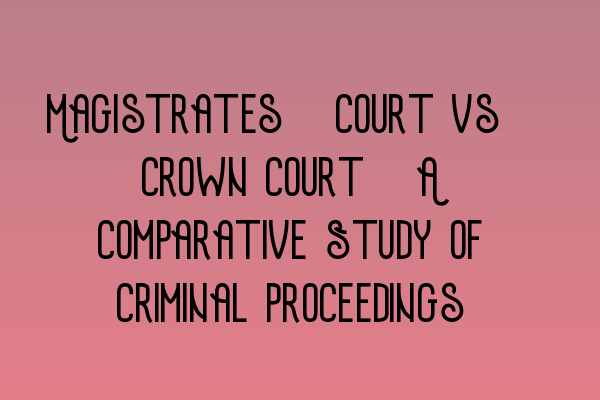Magistrates’ Court vs. Crown Court: A Comparative Study of Criminal Proceedings
When it comes to criminal proceedings in the United Kingdom, individuals accused of crimes can find themselves navigating two primary types of courts: Magistrates’ Court and Crown Court. Understanding the differences between these two court systems is essential for anyone involved in criminal law cases. In this article, we will conduct a comparative study of these courts to shed light on their distinct features and functions.
Magistrates’ Court
The Magistrates’ Court is the lower court in the English legal system. It primarily handles less serious criminal cases and serves as the starting point for most criminal proceedings. This court is presided over by magistrates, who are legally trained volunteers without formal legal qualifications. Magistrates have the authority to hear and pass judgment on cases such as minor theft, public disorder offenses, drink driving, and minor assault. They can also grant bail and conduct preliminary hearings.
Magistrates’ Court proceedings are relatively informal compared to Crown Court proceedings. The process follows a structured format, and the court aims for swift decisions to ensure the efficient administration of justice. The parties involved in the case, including the defense and prosecution, present their arguments, provide evidence, and question witnesses. The decisions made in Magistrates’ Court are not final and can be appealed to the Crown Court if deemed necessary.
For individuals pursuing legal careers, understanding the workings of the Magistrates’ Court is vital. It forms the basis for criminal law practice and offers valuable insight into the initial stages of a criminal case. Aspiring solicitors and barristers can benefit from taking SQE 1 Preparation Courses that cover the essentials of criminal law and the procedures followed in the Magistrates’ Court.
Crown Court
The Crown Court sits above the Magistrates’ Court and deals with more serious criminal offenses. Unlike the Magistrates’ Court, the Crown Court comprises professional judges, including circuit judges and high court judges, along with a jury. The cases heard in this court involve crimes such as murder, rape, serious assault, drug trafficking, and complex fraud.
Proceedings in the Crown Court are more formal and adhere to strict legal protocols. The judge presides over the trial, ensuring everyone follows the law and making decisions on legal matters. The jury decides the defendant’s guilt or innocence based on the evidence presented and the judge’s instructions. Sentencing, if applicable, is also conducted in the Crown Court.
Attending SQE 1 Practice Exam Questions can be highly beneficial for law students and aspiring practitioners seeking to enhance their understanding of criminal proceedings in the Crown Court. This practice prepares them for the practical challenges they may encounter, such as analyzing evidence, formulating legal arguments, and presenting their case effectively.
Comparative Study
When comparing the two courts, several key differences emerge:
- Legal Representation: In both courts, defendants can choose to be represented by solicitors or barristers. However, in the Magistrates’ Court, defendants are not required to have legal representation, while in the Crown Court, legal representation is crucial due to the complexity of the cases.
- Judgment and Sentencing: The Magistrates’ Court can pass sentences for relatively minor offenses, including fines, community service, and short periods of imprisonment. The Crown Court has the power to impose more severe penalties, including long-term imprisonment, life sentences, and serious fines.
- Appeals: Appeals from the Magistrates’ Court are heard in the Crown Court, whereas appeals from the Crown Court are made to the Court of Appeal.
- Jury Trials: Jury trials only take place in the Crown Court. Magistrates’ Court trials are decided by the magistrate(s) alone.
Understanding the fundamental differences between Magistrates’ Court and Crown Court is crucial for legal professionals and individuals involved in criminal cases. Whether you are pursuing a legal career or have a personal interest in the criminal justice system, acquiring knowledge about these courts is essential.
To further enhance your understanding of criminal law and the specific procedures followed in both courts, consider enrolling in SQE 2 Preparation Courses. These courses provide comprehensive coverage of criminal law processes and equip you with the necessary skills to excel in your legal career.
If you are preparing for the Solicitors Qualifying Examination (SQE) and need information about exam dates, refer to the SRA SQE Exam Dates article. It contains all the necessary details about the examination schedule and registration process.
In conclusion, the Magistrates’ Court and the Crown Court play significant roles in the criminal justice system of the United Kingdom. While the former handles less serious offenses and serves as a starting point for most criminal proceedings, the latter deals with more complex and serious crimes. Acquiring a comprehensive understanding of the similarities and differences between these courts is essential for legal professionals and individuals involved in criminal cases.
